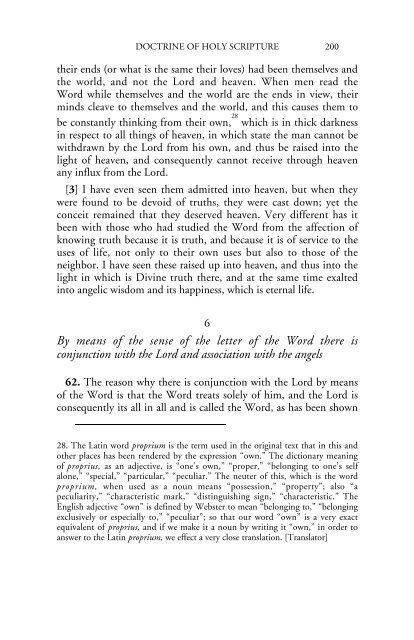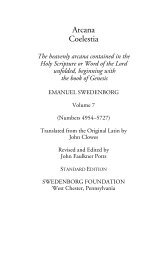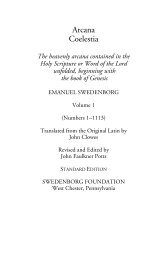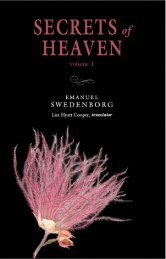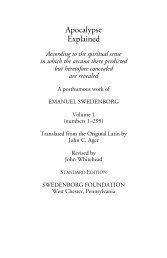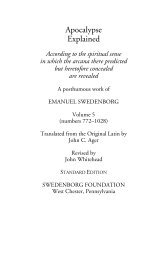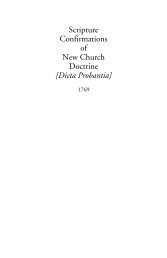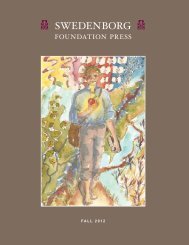Doctrine of Holy Scripture - Swedenborg Foundation
Doctrine of Holy Scripture - Swedenborg Foundation
Doctrine of Holy Scripture - Swedenborg Foundation
- No tags were found...
You also want an ePaper? Increase the reach of your titles
YUMPU automatically turns print PDFs into web optimized ePapers that Google loves.
DOCTRINE OF HOLY SCRIPTURE 200their ends (or what is the same their loves) had been themselves andthe world, and not the Lord and heaven. When men read theWord while themselves and the world are the ends in view, theirminds cleave to themselves and the world, and this causes them tobe constantly thinking from their own, 28 which is in thick darknessin respect to all things <strong>of</strong> heaven, in which state the man cannot bewithdrawn by the Lord from his own, and thus be raised into thelight <strong>of</strong> heaven, and consequently cannot receive through heavenany influx from the Lord.[3] I have even seen them admitted into heaven, but when theywere found to be devoid <strong>of</strong> truths, they were cast down; yet theconceit remained that they deserved heaven. Very different has itbeen with those who had studied the Word from the affection <strong>of</strong>knowing truth because it is truth, and because it is <strong>of</strong> service to theuses <strong>of</strong> life, not only to their own uses but also to those <strong>of</strong> theneighbor. I have seen these raised up into heaven, and thus into thelight in which is Divine truth there, and at the same time exaltedinto angelic wisdom and its happiness, which is eternal life.6By means <strong>of</strong> the sense <strong>of</strong> the letter <strong>of</strong> the Word there isconjunction with the Lord and association with the angels62. The reason why there is conjunction with the Lord by means<strong>of</strong> the Word is that the Word treats solely <strong>of</strong> him, and the Lord isconsequently its all in all and is called the Word, as has been shown28. The Latin word proprium is the term used in the original text that in this andother places has been rendered by the expression “own.” The dictionary meaning<strong>of</strong> proprius, as an adjective, is “one’s own,” “proper,” “belonging to one’s selfalone,” “special,” “particular,” “peculiar.” The neuter <strong>of</strong> this, which is the wordproprium, when used as a noun means “possession,” “property”; also “apeculiarity,” “characteristic mark,” “distinguishing sign,” “characteristic.” TheEnglish adjective “own” is defined by Webster to mean “belonging to,” “belongingexclusively or especially to,” “peculiar”; so that our word “own” is a very exactequivalent <strong>of</strong> proprius, and if we make it a noun by writing it “own,” in order toanswer to the Latin proprium, we effect a very close translation. [Translator]


